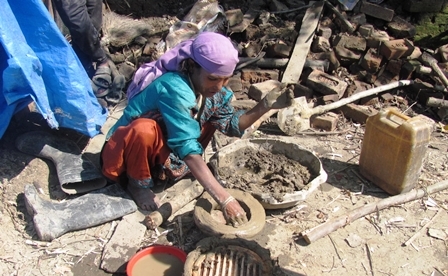A visit to the Kashmir valley shows disturbing truths of how an apathetic Government is disinterested in helping homeless residents.
 by Humra Quraishi
by Humra Quraishi
I have been restless and upset by the goings-on in the country. I decided to escape the news of the maddening incidents in Dadri and elsewhere with a trip to Kashmir. Only…there is no escaping any grim reminder of the present-day Indian realities when one reaches the Valley. For the reminders come brutally fast and thick here. If anything, one is filled with more despair at the plight of marginalised Indians in the country.
I travelled to Kashmir to report on flood victims and their survival in the backdrop of the fact that those rendered homeless by the ghastly floods are still homeless. Even after a year, as autumn paves way for another harsh winter, there has been no Government assistance to these people. Besides a sense of deep gloom, there is also simmering disgust at the PDP joining hands with the BJP. The latter is widely perceived as a dangerous communal force that will only bring ruin to the Valley.
Even as the BJP makes inroads in the region, I was taken aback at how bitter the average Kashmiri is about the state of his or her life in the State. From cab drivers to persons of the elite class, the opinion is unanimous: the PDP made a huge mistake by partnering with the BJP, and there is hope (even at this late hour) if the two were to part ways. The anger stems from the perception that the RSS is guiding the hands of the BJP in Kashmir (as in other places) and this can only lead to destruction of everything that Kashmiris hold dear.
A young gentleman I met there was vocal about the BJP and Modi. “How can Modi sarkar talk of a Common Civil Code while Muslims and Dalits and Christians are treated like third class citizens?” he wondered. “The Government hangs Yaqub Memon and Afzal Guru, but spares Hindu terrorists from Mumbai to Karnataka to Uttar Pradesh to Madhya Pradesh! Even if one does not want to equate terrorism with any religion, these lapses make one think along these lines. Why are Ministers like Mahesh Sharma allowed to speak whatever they please? Will ordinary citizens like myself be allowed to make provocative statements and not get arrested?”
I also write today about Engineer Rasheed, J&K’s only independent MLA, who I met on October 5, a couple of days after he hosted his infamous beef party. He told me he was a qualified engineer but decided to contest elections to save himself from police brutality – he has faced a lot of it in his younger days. “I wasn’t politically inclined, my basic idea in standing for elections was to save myself from police threats and torture.
“I have gone through hell all through my adult years. I have been wrongly imprisoned, tortured in lock-ups…” He is so wary of the police that he has declined police protection even as an MLA! “I am not comfortable with the police and I have declined all forms of security. I have declined escort vehicles, too.”
Such is the State of affairs, then, that even an MLA shies away from contact with the police. Can one imagine what the ordinary Kashmiri goes through?
Humra Quraishi is a senior political journalist based in Gurgaon. She is the author of several books, including Kashmir: The Untold Story and Dagars and Dhrupad, among others.
(Picture courtesy www.ipsnews.net. Image is used for representational purpose only)







